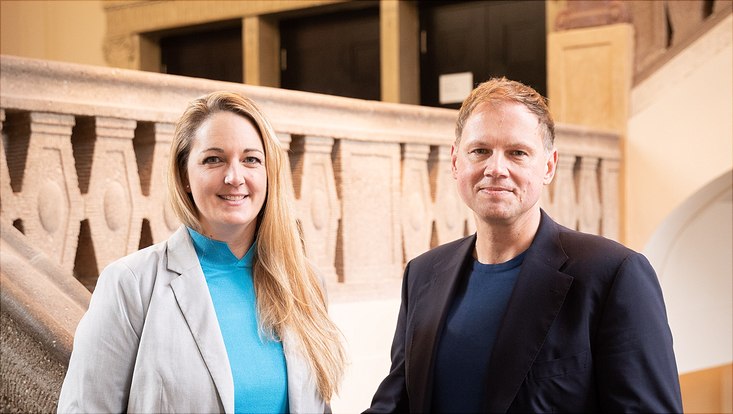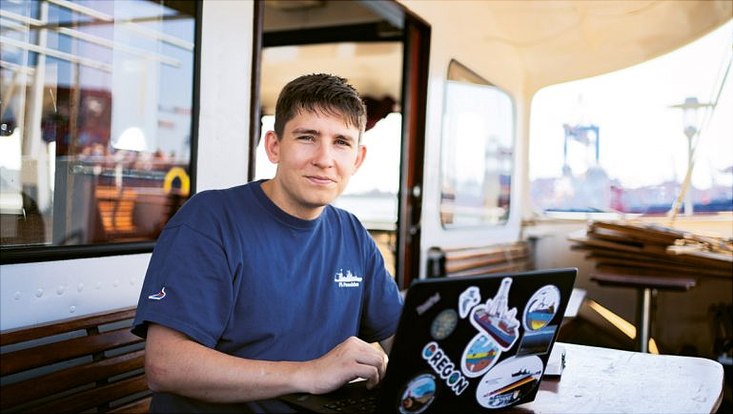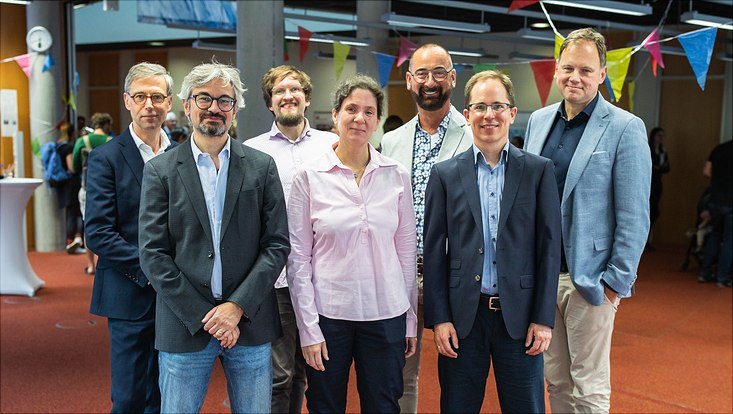University president Hauke Heekeren and CSO Laura Marie Edinger-Schons in an interview on sustainability.“Looking for Synergies Across the University”
5 December 2022, by Jacinta Homans

Photo: Patrick Lux
In December 2022, Universität Hamburg appointed a Chief Sustainability Officer (CSO), Laura Marie Edinger-Schons. Together with Hauke Heekeren, she speaks about the new role, the first measures to be implemented, and the key challenges.
Mr. Heekeren, since the beginning of your office as president, you have been pushing the subject of sustainability forward, now you have appointed Laura Marie Edinger-Schons as the chief sustainability officer and as professor for sustainability economics. Why is the subject of sustainability to important to you?
Heekeren: Humanity is facing existential challenges: climate change, species extinction, resource scarcity, just to name a few. As a University, we want to and must face these challenges at every level, in terms of research, teaching, and administration. I am convinced that we have a duty to contribute to finding solutions, and that as a University as a whole.
Ms. Edinger-Schons, how did you come to the subject of sustainability as a researcher?
Edinger-Schons: I started very early as a researcher looking into matters of corporate responsibility. What really opened my eyes was a research stay in south-east Asia, where I was confronted with the immediate effects of changes to the ecosystem on people, for example the deforestation of rainforests, or plastic waste in the ocean. A visit to sulfur mine in east Java really left a lasting impression on me. Visitors were recommended to restrict their time there to less than 15 minutes. But there are people working there every day, performing the heaviest of physical labor, without any protection in the most toxic fumes. I started researching, to find out who were companies obtaining their raw materials here, and thus participating in the exploitation of people and the environment? And how can companies be made to take on more responsibility for it? These questions have not left me.
Mr. Heekeren, was can the University do in terms of sustainability, particularly in terms of its role in society, and as an academic institution?
Heekeren: We have a leading role and see ourselves as a flagship university that is working to make meaningful contributions across many fields. For example, the broad range of subjects and the courses we offer with a focus on sustainability show clearly that we are intensely involved in sustainability, both professionally and privately. We also provide the results of our research, as well as the expertise of our researchers, to the community and the political realm. Of course we hope to find a receptive audience. As a University, we will also take steps to move forward sustainably, and we have ambitious goals. That is why I am very happy that we have appointed a recognized expert in Ms. Edinger-Schons.
Ms. Edinger-Schons, what are the first steps you will take to advance sustainability in Universität Hamburg?
Edinger-Schons: I would first like to get know the University, and collect the information I need to develop an evidence-based strategy. We will then analyze what are the most effective measures, and how we can best position ourselves? The integration of digitalization and sustainability is really important. That means it is clear we need a digital University in order to become sustainable. It will be based on an emissions balance sheet, but will extend far beyond climate matters. Through our research, our teaching, and our knowledge exchange, we can have very positive impact on sustainable development. In general, we want to reduce the negative impact of our presence, and maximize the positive impact of our activities.
Mr. Heekeren: In terms of participation, how are you going to involve people at the University?
Heekeren: We are looking for synergies across the University. I have spent the past few months meeting people, an experience which has showed me we have a lot of engaged people with lots of great ideas. We want to support those involved in sustainability issues. And we want to take this energy, and this inspiration, and use them to tackle constructive challenges. As a specific example, there was a suggestion to get the University certified as being bicycle-friendly, to provide more bicycle paths and bicycle parking. This is great, and we’re working towards it!
Edinger-Schons: There will be “quick win” projects, that is, changes that can be quickly implemented that will bring us ahead in terms of sustainability. And there will be projects that are more long-term. We want to move soon into knowledge exchange, and of course also into action, for example, with research groups for anyone who is interested and wanting to be involved in specific projects. There should also be regular open sustainability plenums for anyone who wants to find out more about the current state of affairs. In general, it is important for me that the topic of sustainability is one filled with positive energy, because sustainability often carries negative associations, like restrictions or doing without, but we can also act to make positive changes.
We don’t just have a CSO now, but also a Sustainability Office. What are its tasks and objectives?
Heekeren: First, we have to see what we already have. In recent years, a lot of preparatory work has been done, for example, through the Center for a Sustainable University, through the climate working group, and the sustainability in research working group. The climate protection manager has also made some very important contributions. Now we are in the process of weaving these strands together, to coordinate them, make them visible, and then of course, to turn that into further action! We also have a lot of fields, like the Cluster of Excellence Climate, Climatic Change, and Society (CLICCS), and the Center for Earth System Research and Sustainability, that are important partners in research and teaching for the CSO and the Sustainability Office. Here we are keeping with the tradition of our Nobel Prize laureate Prof. Klaus Hasselmann and his pioneering research on climate change.
Edinger-Schons: We are thinking to locate our office, at least in part, on the campus to make it visible, and to provide innovative and of course the most sustainable space possible for workshops, exhibits, and working spaces for the team. We are considering a kind of climate neutral “Sustainability Village.” I am looking forward to the new tasks and the constructive collaboration with all the disciplines in the University, and I really hope we can achieve a good exchange of ideas and knowledge with a lot of innovative projects.
One focus project is the climate strategy. What are you planning with this?
Edinger-Schons: The climate working group has already started to put together a greenhouse gas emissions inventory considering all three scopes of the Greenhouse Gas Protocol (direct, indirect, and value-chain). This will be the starting point for our efforts to build a solid information base that will allow us to identify our emissions hot-spots and prioritize measures for action. The collection of data is often one of action and reflection. To make sure that the information is as well presented and integrated as possible, we often need to use new, digital processes. All members of the University will then be involved in the implementation of these measures, we can only do it if we work together. And I am really looking forward to it!
Heekeren: The goal is to put Universität Hamburg on the best possible footing to achieve climate neutrality. This is how we will find and forge new paths into the future for the whole of the University.
About
For more information about Prof. Dr. Laura Marie Edinger-Schons, visit the Faculty of Socioeconomics pages.


